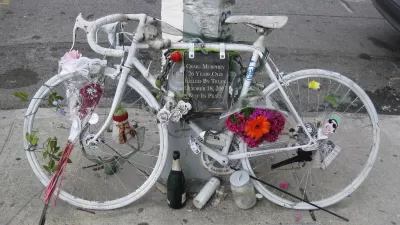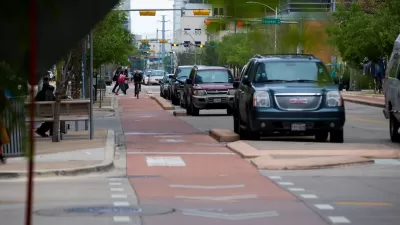Road diets, whereby the number of traffic lanes are reduced to better accommodate cyclists, can be controversial. But what of the opposite—adding lanes to better accommodate motorists? A cyclist died after such an "improvement." A lawsuit followed.

"In June 2012, Dr. Gerald Brett Weiss, a nationally known neurosurgeon, was killed when he was hit from behind while riding his bicycle in the community of Indian Wells [Riverside County], CA," writes Robbie Webber, senior associate at the State Smart Transportation Initiative. "In mid-November of this year his family won a $5.6 million judgment [sic] against Indian Wells, claiming that the city was negligent in not providing sufficient width for bike lanes or lighting that would have prevented the crash."
Never mind that the motorist that killed Dr. Weiss was allegedly drunk, as the city argued. "Experts in court deemed there wasn't enough room in the lane for both the car and the bike, so regardless of alcohol intoxication, the crash was bound to have happened," reports Natalie Brunell for KESQ News. [Video here.]
The roadway had been "expanded from two lanes to three in each direction in 2005, the city did not include a wide outside lane in the design," writes Webber. "In addition, the road previously had bike lanes and was signed as a bike route before the redesign.
Webber's final words are to city transportation planners and engineers:
Governments may want to consider the implications of roadway designs that do not provide safe conditions for all users."
In fact, that's one reason for "complete streets" legislation: to ensure that streets are "designed and operated to enable safe access for all users, including pedestrians, bicyclists, motorists and transit riders of all ages and abilities," according to Smart Growth America.
It's vital to distinguish the "outside," meaning closest to the curb, lane from the inner lanes in terms of lane width. As posted here earlier, it's often preferable to have 10-foot travel lanes over 12-foot inner lanes.
The State Smart Transportation Initiative, housed at the University of Wisconsin, promotes transportation practices that advance environmental sustainability and equitable economic development.
Hat tip to Metro Transportation Library.
FULL STORY: California city loses lawsuit after death of bicyclist on road with substandard bike lanes and no lighting

Maui's Vacation Rental Debate Turns Ugly
Verbal attacks, misinformation campaigns and fistfights plague a high-stakes debate to convert thousands of vacation rentals into long-term housing.

Planetizen Federal Action Tracker
A weekly monitor of how Trump’s orders and actions are impacting planners and planning in America.

San Francisco Suspends Traffic Calming Amidst Record Deaths
Citing “a challenging fiscal landscape,” the city will cease the program on the heels of 42 traffic deaths, including 24 pedestrians.

Defunct Pittsburgh Power Plant to Become Residential Tower
A decommissioned steam heat plant will be redeveloped into almost 100 affordable housing units.

Trump Prompts Restructuring of Transportation Research Board in “Unprecedented Overreach”
The TRB has eliminated more than half of its committees including those focused on climate, equity, and cities.

Amtrak Rolls Out New Orleans to Alabama “Mardi Gras” Train
The new service will operate morning and evening departures between Mobile and New Orleans.
Urban Design for Planners 1: Software Tools
This six-course series explores essential urban design concepts using open source software and equips planners with the tools they need to participate fully in the urban design process.
Planning for Universal Design
Learn the tools for implementing Universal Design in planning regulations.
Heyer Gruel & Associates PA
JM Goldson LLC
Custer County Colorado
City of Camden Redevelopment Agency
City of Astoria
Transportation Research & Education Center (TREC) at Portland State University
Jefferson Parish Government
Camden Redevelopment Agency
City of Claremont





























